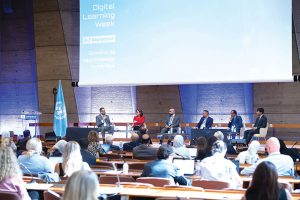PARIS / WAM
Within his participation in the Unesco Digital Learning Week 2023, Omar bin Sultan Al Olama, Minister of State for Artificial Intelligence, Digital Economy, and Remote Work Applications and Chairman of the Digital School Board, stated that the UAE, led by President His Highness Sheikh Mohamed bin Zayed Al Nahyan adopts a future-oriented vision for shaping the future of education.
The UAE vision mainly relies on advanced technology and agile digital solutions, which have the ability to reach students anytime, anywhere, thus ensuring inclusive and fair learning opportunities for students around the world.
During Al Olama’s participation in a special scientific ministerial session entitled “Reimagining the Futures of Knowledge and Research Using Generative AI,” he explained that “the UAE government is developing a leading experience in the field of digital education, in line with the directives of His Highness Sheikh Mohammed bin Rashid Al Maktoum, Vice President and Prime Minister of the UAE and Ruler of Dubai, which focus on ‘digital education as the future of education and education of the future’”.
The session also hosted two of the most prominent AI scientists in the world, namely Yoshua Bengio, Full Professor in the Department of Computer Science and Operations Research at Université de Montréal and the Founder and Scientific Director of Mila — Québec Artificial Intelligence Institute, and Yann LeCun, Vice President and Chief AI Scientist at Meta, along with Dr. Dipu Moni, Minister of Education of Bangladesh, and Ester Anna Nghipondoka, Minister of Education, Arts and Culture, Namibia.
“The UAE government adopts a clear vision to adopt AI in various sectors, and employ its advanced solutions in developing the future of education in particular. The new directions of global initiatives in education focus on digital education as a main, innovative solution to the challenges of students’ access to education,” the UAE minister further noted.
Al Olama presented the UAE’S strategy for adopting and employing generative AI solutions and tools in various fields, including education. He highlighted the ongoing coordination between the Digital School and the UAE’s permanent delegation to the Unesco to enhance global efforts and raise awareness on the importance of digital education and its role in providing innovative opportunities and solutions for students worldwide. He called on countries to develop the education sector by adopting modern technology, AI and digitisation solutions, to ensure the involvement of many countries and societies in developing a future digital education model.
The Unesco Digital Learning week witnessed the active participation of the UAE delegation. The Digital School organised a workshop on the future of digital education, in which Dr Hassan Al Muhairi, Assistant Undersecretary for the Curriculum Sector at the Ministry of Education, gave a keynote speech about the UAE’s experience in digital education. In addition, Professor Chris Dede, Professor of Learning Technologies at the Graduate School of Education at Harvard University, addressed the topic of reshaping traditional schools in the era of AI and digital learning, whereas Professor Tim Unwin, Emeritus Professor of Geography at Royal Holloway, University of London, highlighted the importance of research and evaluation of the digital education projects.
A special plenary session was held to highlight the experiences of countries participating in the Digital School initiative. Session participants included Erika Twani, Director of the Digital School project in Colombia, Saadettin Muvakit, Director of the Digital School for Syrian refugees in Lebanon, and Iimam Hammoud, Director of community education at the Ministry of National Education and Education Reform in the Islamic Republic of Mauritania and Director of the Digital School project in Mauritania, Quddus Pativada, CEO of Digest AI, and Dr. Waleed Al Ali, Secretary General of the Digital School. The session was moderated by Dr. Fawzan Al Khalidi, consultant at the Digital School.
Leela Devi Dookun-Luchoomun, Minister of Education of Mauritius, Murhaf Al-Madani, Assistant Minister of Education for Development and Transformation in the Kingdom of Saudi Arabia, Leonardo Garnier, Special Advisor to the Secretary-General of the United Nations on the Transforming Education Summit, and a group of experts, specialists and representatives of countries and organisations also joined the session, discussing opportunities and challenges in modern policies and strategies for digital education. A number of countries shared their experiences in implementing digital education models, and how it has contributed to empowering students and teachers.
Experts also discussed the major changes in the future of education caused by the fast-paced development in innovation and advanced technology, and how this will act as an enhancing factor for the efforts to accelerate progress in achieving the fourth SDG related to education.
 The Gulf Time Newspaper One of the finest business newspapers in the UAE brought to you by our professional writers and editors.
The Gulf Time Newspaper One of the finest business newspapers in the UAE brought to you by our professional writers and editors.
